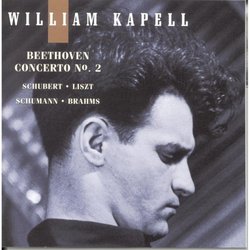| All Artists: Ludwig van Beethoven, Franz [Vienna] Schubert, Nicolo Paganini, Robert Schumann, Johannes Brahms, Franz Liszt, Vladimir Golschmann, NBC Symphony Orchestra, William Kapell Title: Beethoven: Concerto No. 2 Members Wishing: 0 Total Copies: 0 Label: RCA Original Release Date: 1/1/2000 Re-Release Date: 3/7/2000 Genres: Dance & Electronic, Classical Styles: Ballets & Dances, Ecossaises, Forms & Genres, Concertos, Short Forms, Historical Periods, Classical (c.1770-1830), Modern, 20th, & 21st Century, Symphonies Number of Discs: 1 SwapaCD Credits: 1 UPC: 090266899425 |
Search - Ludwig van Beethoven, Franz [Vienna] Schubert, Nicolo Paganini :: Beethoven: Concerto No. 2
 | Ludwig van Beethoven, Franz [Vienna] Schubert, Nicolo Paganini Beethoven: Concerto No. 2 Genres: Dance & Electronic, Classical
|
Larger Image |
CD Details |
CD ReviewsOne of the best performances of the second concerto Hiram Gomez Pardo | Valencia, Venezuela | 03/23/2004 (5 out of 5 stars) "In this performance of Beethoven`s second's concert Kapell makes an dionisiac approach . The notes under his fingers are played with such kind of "velvet touch", (specially the second movement) that it doesn't let you indifferent. His reading is far from being romantic. It's a classical view. May be this is the reason why Beethoven is so difficult to play. It comes to my mind the performance given by Glenn Gould in 1958, and I think this is the only version that is near respect his warmth and lyrical rendition. But coming to Kapell, his performances seem to have the perfection`s mark . One could think that Kapell would have a strange premonition in every one of of his records, that his presence in the world wasn't long. Anyway to all these people that haven`t heard enough to Mr. Kapell , this is your chance to know to the keyboard`s prince. I've been a Kapell`s fan since 1970 when I knew about him in a live performance from Australia in the 4 scherzos of Chopin. Since that day , the only pianist that I remember whose playing is so cantabile, comittment with the score and interpretative fire is Sviatoslav Richter. And the other two whose poetry is to his level are Dinu Lipatti and Samson Francois. The early death of Kapell became a great loss for the musical world and his place in the throne that he represented is yet empty. Kapell is a true legend in the keyboard and I believe his craft will be inextinguible." The highlight is a truly great Beethoven Second Santa Fe Listener | Santa Fe, NM USA | 05/12/2009 (5 out of 5 stars) "Kapell is America's Dinu Lipatti, a greatly gifted pianist who died tragically young. No better proof of his powers exists than this Beethoven Concerto #2, which sounds to my ears exactly as Beethoven should sound -- bold, imaginative, dramatic. We know for certain that Beethoven was such a pianist himself. Kapell, like Rudolf Serkin, keeps the listener on his toes by eagerly leaning into the next phrase, so that you always feel that a drama is unfolding. There's nothing laid-back or genteel in Kapell's approach, and the reliable Vladimor Golschmann provides accompaniment in kind. The sound is definitely historical, though, with fuzziness and microphone distortion during loud passages; it's otherwise quite listenable. The orchestra can be more than a little scrappy, too. But none of this mars a great performance shot through with excitement.
This disc is taken from RCA's complete Kapell Edition, and as with Lipatti, some of the remaining archival recordings are fairly marginal for sound quality. Kapell was a marvel in Schubert, his playing as authoritative as Richter's and as humane as Schnabel's. It's not hard to put up with some minimal hiss, gritch, and tonal hardness to bask in his art. After two brief Schumann interludes, three familiar Liszt numbers end the program, allowing Kapell to throw off some sparks. He seizes the opportunity only intermittently. The Petrarch Sonetto no. 104 is interpreted directly, almost plainly, without Lisztian mannerisms (the audience at the time would have known all about those from Horowitz). Kapell remains subdued in the Hungarian Rhapsody no. 11, catching fire with impulsive outbursts that seem genuinely gypsy -- a glittering, improvisatory account. Those of us addicted to cheap thrills are waiting for the Mephisto Waltz, and Kapell doesn't disappoint. RCA keeps up its good job at remastering, and even though the piano sounds boxed-in here, Kapell is in great form, not quite the wizard as Horowitz but worth the comparison. I am convinced that among the young American pianists after the war whose careers were cut short -- Kapell, Graffmann, Fleisher, and Janis -- he was the most complete musician. Everyone should take a listen." |

 Track Listings (19) - Disc #1
Track Listings (19) - Disc #1